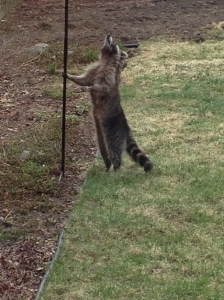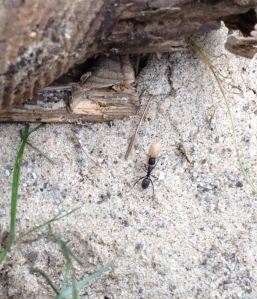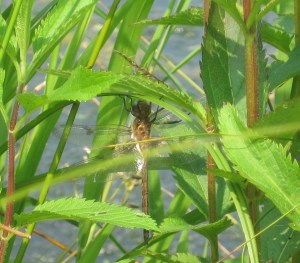 “Now that I’m homeschooling, I’ll be teaching the boys creationism, of course.”
“Now that I’m homeschooling, I’ll be teaching the boys creationism, of course.”
The chuckle I’d expected from my father didn’t come. He paused, unsure what to say. My decision to homeschool my older had somewhat unnerved him, as it wasn’t the typical path, but he was never one to meddle in my life. I’d rarely even seen him pause like that, processing thoughts that were likely previously thought unthinkable. Creationism? How could that be?
“I’m kidding, Dad,” I reassured him, a bit surprised he’d even thought it was possible. He exhaled but still looked a bit shaken. He was then a Biology professor at a state university and is still today a liberal Presbyterian. He is committed to science while believing in God, and he finds no conflict between science and his religion. I was raised with both, understanding evolution and believing in God, never seeing conflict between them. And while I left my belief behind about a decade ago, it wasn’t because of science.
What does it mean to understand biology through the lens of science? It means to understand that from the simplest species to the most complicated, natural selection drives the changes to that species. Genes copy with errors, and errors can wreak havoc with life or increase the chance of an individual surviving to reproduce. And that’s what life (in the biological sense) is all about — making more of a species. From antibiotic resistance in bacteria to the form and function of the mammalian eye to the modern human today, evolution is the driver. It’s wily driver, without direction or purpose. Every slip of DNA’s copying mechanism is random, with ‘goodness’ or ‘badness’ relative to where the alteration occurred, what (if any) effect it has on the organism, and even the environment in which that organism lives.
To teach biology without this understanding is to miss much of what biology is. To limit evolution to that bacteria’s antibiotic resistance or the finch’s beak is to mangle the very mechanism of change in the living world. It’s akin to teaching composition without discussing grammar. Evolution is how change happens, and biology can only be fully understood by appreciating that overarching truth in science.
So a few weeks back, when I tucked into evolutionary biologist’s David Barash’s recent opinion piece in the New York Times, God, Darwin, and My College Biology Class, I found myself nodding along. Barash begins his undergraduate animal behavior class with what he calls “The Talk.” This lecture affirms that his class with look at all of biology through the lens of evolution, a statement I make on my biology syllabus for the classes I’ve taught my sons and their friends and that other families have used as well. I admittedly have an advantage, as my students are known to me and from families where creationism isn’t part of the curriculum. And so evolution simply permeates the class, with religion rarely brought up. It is, after all biology class.
Barash’s classes are more diverse than my tiny home classroom, and I imagine my father’s were similarly diverse. College biology may be the first place conservative Christians rooted in creationism or, its euphemism, Young Earth creationism, may first experience biology through that lens of evolution in a way that affirms the process rather than denies its validity. That could easily put a student on guard, worried about veracity of the rest of the course or thinking about at least part of his or her faith. I’d agree is seems wise to warn — or at least inform — the class of the lens in place. That should be sufficient.
 I can’t recall any reference to religion in any of my biology courses in either my Catholic high school or Catholic university. Religion wasn’t mentioned, and no one every asked, as far as I recall, if it should or shouldn’t be discussed in the science classroom. Barash takes the offensive, as he starts with a talk about religion and science. He doesn’t stop at stating that evolution is the underpinning of biology, and that all will be discussed through that lens. He does not hold, as I do (and as does Stephen Gould) that science and religion are “non-overlapping magisteria,” meaning they have separate domains and are, therefore, compatible understandings in a single human being. Instead, Barash tells his students that religion and science do overlap in domain, and that accepting evolution demands deconstruction of any belief in “an omnipotent and omnibenevolent God.”
I can’t recall any reference to religion in any of my biology courses in either my Catholic high school or Catholic university. Religion wasn’t mentioned, and no one every asked, as far as I recall, if it should or shouldn’t be discussed in the science classroom. Barash takes the offensive, as he starts with a talk about religion and science. He doesn’t stop at stating that evolution is the underpinning of biology, and that all will be discussed through that lens. He does not hold, as I do (and as does Stephen Gould) that science and religion are “non-overlapping magisteria,” meaning they have separate domains and are, therefore, compatible understandings in a single human being. Instead, Barash tells his students that religion and science do overlap in domain, and that accepting evolution demands deconstruction of any belief in “an omnipotent and omnibenevolent God.”
After discussion of the complexity created by natural selection and the illusion of humans as central in the living world, Barash settles into theodicy, an issue far afield of the evolution he sets out to explain. Problems with theodicy (the attempt to reconcile suffering in the world occurring in the presence of an omnipotent, caring deity) contribute to many a person of faith’s loss of that faith. Veering from science, Barash steps broadly into religion, confronting students with the news that if they buy evolution, their faith will likely fall, provided they’re thinking deeply enough:
The more we know of evolution, the more unavoidable is the conclusion that living things, including human beings, are produced by a natural, totally amoral process, with no indication of a benevolent, controlling creator. (Barash)
As an agnostic who sees science through the lens of evolution and the universe as a mystery we ever so slowly unwrap, origin somewhat understood, but only with the most tenacious grasp, I find myself irritated with Barash. Like other militant atheists (and I’m assuming he is an atheist), he forces a narrow lens on what God must be to the believer: God, it seems, must be creator of all, simple and complex, pulling each string and guiding each change. God must create humans as separate, with some of God’s supernaturalness in humans but not other creatures. God must be absent given suffering in the world.
About a decade ago, I left my faith behind. But I didn’t lose it in the science classroom, and I didn’t lose it because I understood that the complexity of life is due to evolution, the roll of the genetic dice paired with environmental pressures. I didn’t lose faith because I understood the long arc of evolution that brought humans into being. I lost it in part to the theodicy question and in part to long thought about what made sense to me. Science wasn’t part of my musing.
My father, a biologist who understands and teaches science through the lens of evolution, a man of faith who is dedicated to helping others of faith, understands that science and faith need not be in conflict. He hasn’t lost his belief, despite decades of science study as a researcher, professor, and interested human being. He, like Barash and I, understand the complexity produced by evolution’s often slow hand, and he is unbothered by the lack of supernatural gene in humans. And the theodicy question? He’s obviously found a way through that one, all while appreciating the science of evolution. And at what cost to his science classes? None.
Barash’s mistakes, in my opinion, are two-fold. First, his view of what God is to a believer is myopic and simplistic. Views of God, gods, goddesses, and divine forces in the universe are as diverse as there are people who believe. Second, his approach is arrogant and presumptive. To tell people who believe just how their faith will be undone is an act of assumed superiority and completely without regard to the personal nature of an individual’s faith. Will some conservative believers, steeped in the absoluteness of a seven-day creation myth struggle as they take biology in a college classroom where evolution is the common currency? Probably. But many believers of all flavors won’t struggle one bit, content with their separation of science and religion.
 Barash wants to warn his students that, should they retain their faith, they will do so only with “some challenging mental gymnastic routines.” How a nonbeliever can begin to step into the mind of a believer and predict whether the wonders of evolution will deepen or destroy the faith of another is beyond me. Yes, science can challenge faith, especially a conservative faith resting on a supreme being pulling the strings and putting humans above all else. But faith, in many forms, can sit comfortably with the scientist, causing no sacrifice to the scientist’s understanding of the universe and the living things inhabiting it. Barash’s talk forwards his own atheist agenda, and that, in the classroom, is going too far.
Barash wants to warn his students that, should they retain their faith, they will do so only with “some challenging mental gymnastic routines.” How a nonbeliever can begin to step into the mind of a believer and predict whether the wonders of evolution will deepen or destroy the faith of another is beyond me. Yes, science can challenge faith, especially a conservative faith resting on a supreme being pulling the strings and putting humans above all else. But faith, in many forms, can sit comfortably with the scientist, causing no sacrifice to the scientist’s understanding of the universe and the living things inhabiting it. Barash’s talk forwards his own atheist agenda, and that, in the classroom, is going too far.
I believe in freedom of speech and freedom of religion, but when at the front of the classroom, I believe you have a responsibility that includes knowing your boundaries. If you’re a biology teacher, teach science. Unabashedly teach evolution and say that you’ll do so. Talk about complexity. Ignore creationism, as it’s not science. And ignore God, whether you believe or not, as faith isn’t part of science. Encourage students struggling with the concepts to discuss their struggle with classmates, their religious leader, their God, or anyone who will listen and let them sort through. But stay out of the wonderings and wanderings of their faith.
I teach biology through the lens of evolution. I’m an agnostic. My father, on a far larger scale, did the same for decades. He’s a Presbyterian. It works.
Cross-posted on Finding My Ground, my personal and religious blogging home.
October 16: Opposing viewpoints are welcome as long as they are on point and respectfully presented. I’m glad to have a conversation that is respectful. All comments will be held for moderation to assure conversation remains civil.


